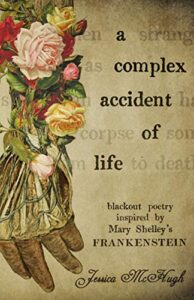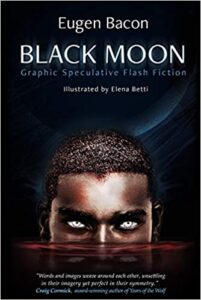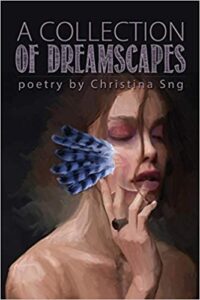A Complex Accident of Life by Jessica McHugh
Apokrupha, 2020
ISBN-13: 979-8647146519
Available: Paperback, Kindle edition ( Amazon.com )
The ghost of Mary Shelley haunts the pages of A Complex Accident of Life by Jessica McHugh. With words insightfully culled from Frankenstein, the blackout poetry in this brilliant jewel of a book captures the tragic intensity, dark fervor, and dramatic suffering of Shelley’s life as well as something totally new, inspired, and relatable.
Through startling images of struggle and determination, this collection also reveals the essence of Shelley’s creative imagination as a writer and her mind and heart as a woman. McHugh tells us, “She felt hope like a moon: / A bright heart nothing could extinguish. / She embraced its bounty / And settled passion upon purpose.” Shelley’s words, like gold deposited decades ago in the novel’s text, are mined and skillfully transformed into a contemporary memoir by the talented McHugh.
On each page of the book, the reader will find an entire printed poem and then, below it, a copy of the blacked out (in color) page from Frankenstein from which the poem was taken. The pages from Frankenstein are in numerical order, which is astonishing when you realize that the poems do not reflect a narrative that parallels that of the novel, and yet one poem smoothly flows into the next encouraging a slow, thoughtful reading.
McHugh has carefully shaped each eloquent verse to stand alone, a sort of reflective snapshot in time. There is something so tender and wounded about these poems; they sometimes seem like private thoughts that should not have been divulged: honest, raw, and deeply felt. McHugh draws us into that place where those thoughts and feelings are simultaneously hers and Shelley’s, and together, they become an expression of universal truths.
Jessica McHugh has truly lifted blackout poetry to an entirely new level of remarkable craftsmanship. Highly recommended.
Reviewed by Nova Hadley
Editor’s note: A Complex Accident of Life is a nominee on the final ballot for this year’s Stoker Awards in the category of Superior Achievement in Poetry.







Follow Us!